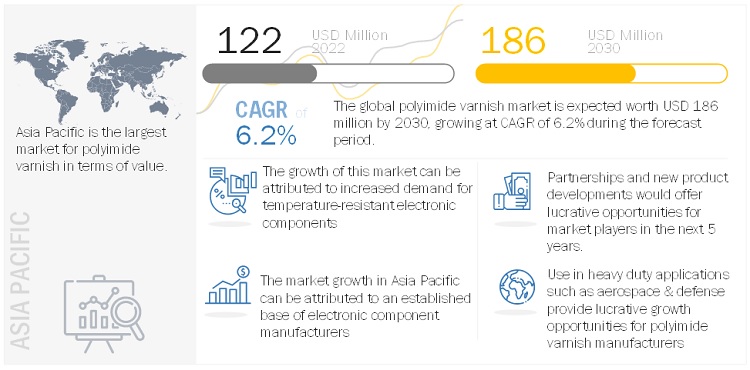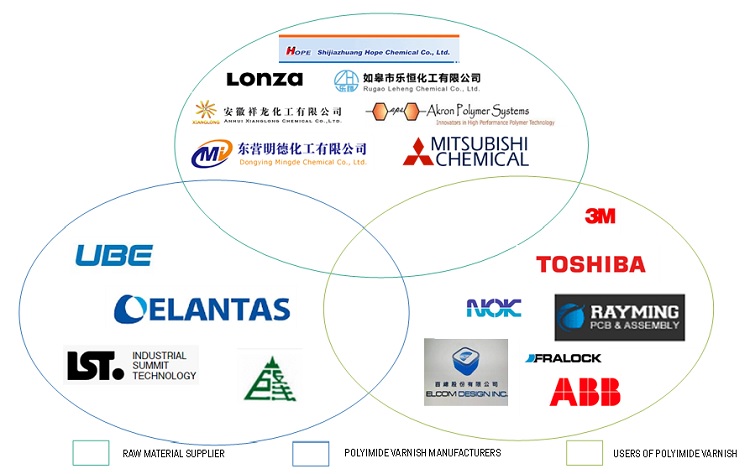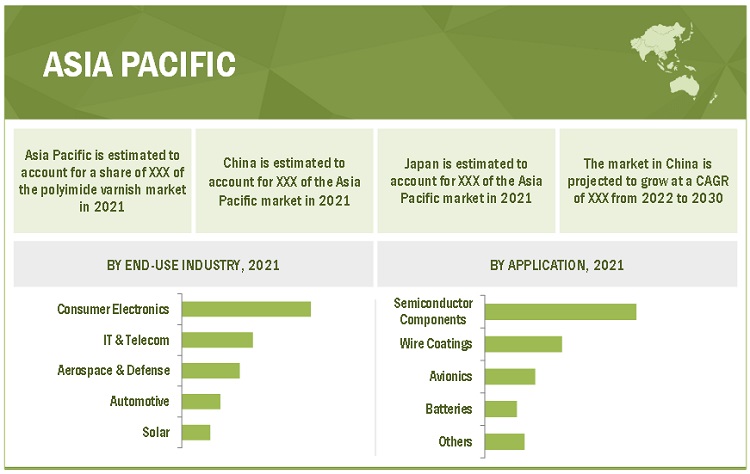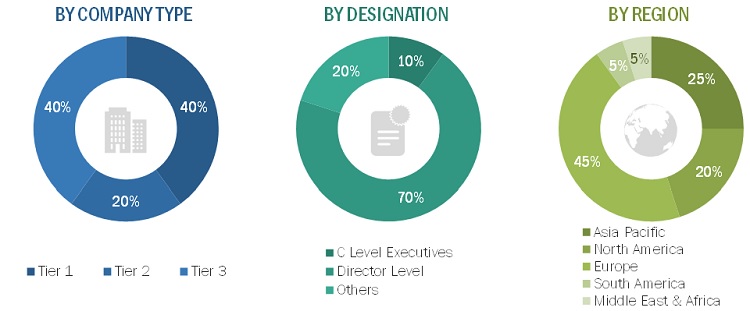Polyimide Varnish Market by Type (Normal Heat Resistant, High Heat Resistant), Application (Semiconductor Components, Wire Coatings, Avionics, Batteries, Display and Others), End-use Industry (Consumer Electronics, IT & Telecom, Aerospace & Defense, Automotive, Solar and Others) and Region - Global Forecast to 2030
The global polyimide varnish market is projected to grow from USD 122 million in 2022 to USD 186 million by 2030, at a CAGR of 6.2% during the forecast period. The polyimide varnish market has grown considerably in recent years and is expected to grow at a higher rate in the coming years. The primary reasons for the increasing demand for polyimide varnish is the growth of the consumer electronics along with demand for temperature-resistant electronic components used in aerospace & defense, automotive, and other industries.
Attractive Opportunities in the Polyimide Varnish Market

To know about the assumptions considered for the study, Request for Free Sample Report
Polyimide Varnish Market Dynamics
Driver: Increased demand for applications in electronics, displays and semiconductor components
Rapid industrialization, economic development, digitalization, and decreasing cost of manufacturing have resulted in an increase in electronic consumerism. Thermal stability, along with superior mechanical and electrical properties, have resulted in a strong demand for polyimide varnishes not only in the electronics industry but also in automotive, aerospace and defense sectors. For instance, in a laptop, the cable that connects the main logic board to the display has a polyimide varnish coating with a copper conductor.
Restraint: High manufacturing cost
The processing of polyimide varnishes is challenging due to their low solubility in common solvents and their high softening temperature. The manufacturing of polyimide varnishes also requires a high degree of technical know-how and special production facilities. Polyimides varnishes are generally created by condensation reaction between a dianhydride and a diamine in a two-stage process. Use of additional reagents also increase the overall cost of polyimide varnishes.
Opportunity: Increased use in aerospace & defense industries
The polyimide varnishes have lower dielectric constant as compared to other optical polymer films. Hence, apart from heat resistance, varnishes may also offer electrical insulating properties. These insulating properties are highly useful in shielding electromagnetic interference encountered in daily life due to the growing number of wireless devices, such as cellphones and GPS, Bluetooth, Wi-Fi, and near-field communication (NFC) technology. Electromagnetic interference can result in temporary disturbances, data loss, and system failures in critical applications such as military & aerospace electronics, mass transit systems, industrial touch screens, and navigation & vehicular control systems.
Challenges: Oligopolistic market
One of the primary challenges associated with polyimide varnishes is that the product is manufactured by only a handful of companies. Companies such as UBE Corporation, IST Corporation, Elantas PDG, Inc. and Suzhou Jufeng Electrical Insulating System also account for approximately two-thirds of the supply market. This creates an oligopolistic market thus favoring the supplier in terms of price negotiation.
Polyimide Varnish Market: Ecosystem

The normal heat resistant segment is projected to grow at a significant CAGR during the forecast period.
Normal heat resistant varnishes offer crosslinked film formation, uniform coating, and reduced shrinkage during the curing process. As a result, these types of varnishes are primarily used in electronics and low-duty applications. These types of varnishes can also be used in coating of electrical wiring to provide resistance to heat and chemicals. As a result, the normal heat resistant type segment is expected to witness highest growth during the forecast period.
The consumer electronics segment will witness a high CAGR during the forecast period
Consumer electronics industry is one of the highest revenue generating sectors across the globe due to the continuous upgradation of electronic products and supported demand from consumers. Polyimide varnishes are primarily used in consumer electronic products in displays, semiconductor components and electrical wirings.

To know about the assumptions considered for the study, download the pdf brochure
Asia Pacific is expected to be the fastest-growing region in the polyimide varnishes market during the forecast period
Population of countries like China, Taiwan, South Korea, Japan and India, are tech-savvy and have a keen eye for premium electronic products. This has caused the consumer electronics market in the Asia Pacific to grow at a much higher rate than other regions of the world. The Asia Pacific region is also slowly picking up on automotive electrification to curb global warming. These developments are expected to play a major role in demand for polyimide varnishes, as they are used for heat and chemical resistance in electronic components and batteries.
Key Market Players
UBE Corporation (Japan), IST Corporation (Japan), Elantas PDG, Inc. (US), Pixomax (South Korea), Mitsubishi Gas Chemical Company (Japan), Suzhou Jufeng Electrical Insulating System (China), Danyang Sida Chemical (South Korea), and Shanghai Tonghao Industrial Trade (China) are among the key players leading the market through their innovative offerings, enhanced production capacities, and efficient distribution channels.
Scope of the report
|
Report Metric |
Details |
|
Market Size Available for Years |
2019, 2020, 2021, 2022, 2023, 2024, 2025, 2026, 2027, 2028, 2029, 2030 |
|
Base Year Considered |
2021 |
|
Forecast Period |
2022–2030 |
|
Forecast Units |
Value (USD Million) |
|
Segments Covered |
By Type, By Application, By End-use Industry and Region. |
|
Geographies Covered |
Asia Pacific, North America, Europe, Middle East & Africa, and South America |
|
Companies Covered |
The major market players include UBE Corporation (Japan), IST Corporation (Japan), Elantas PDG, Inc. (US), Pixomax (South Korea), Mitsubishi Gas Chemical Company (Japan), Suzhou Jufeng Electrical Insulating System (China), Danyang Sida Chemical (South Korea), and Shanghai Tonghao Industrial Trade (China) |
This research report categorizes the microcapsule market based on type, application, end-use industry and region.
Based on type, the polyimide varnish market has been segmented as follows:
- Normal heat resistant
- High heat resistant
Based on application, the polyimide varnish market has been segmented as follows:
- Semiconductor Components
- Wire Coatings
- Avionics
- Batteries
- Display
- Others
Based on end-use industry, the polyimide varnish market has been segmented as follows:
- Consumer Electronics
- IT & Telecom
- Aerospace & Defense
- Automotive
- Solar
- Others
Based on regions, the polyimide varnish market has been segmented as follows:
- Asia Pacific
- North America
- Europe
- Middle East & Africa
- South America
Frequently Asked Questions (FAQ):
What is a polyimide varnish?
Polyimide varnish is a solution of polyimide precursor-polyamic acid. It is formed from condensation polymerization reaction between aromatic diamine and anhydride.
What are the different types of polyimide varnishes?
The different types of polyimide varnishes are normal heat resistant and high heat resistant.
Which are the key companies operating in the global polyimide varnish market?
UBE Corporation, Elantas PDG, Inc., IST Corporation and Suzhou Jufeng Electrical Insulating System are some of the major companies operating in this market.
What are the key strategies adopted by the market players?
The companies involved in the polyimide varnish market have focused on partnerships as their key strategies to increase their geographical reach and business revenue.
What is the COVID-19 impact on the polyimide varnish market?
COVID-19 outbreak had a moderate impact on the global demand for the polyimide varnish market. Logistic disruptions, closures of manufacturing plants, and the shutdown of construction activities affected this market in 2020. .
To speak to our analyst for a discussion on the above findings, click Speak to Analyst

TABLE OF CONTENTS
1 INTRODUCTION
1.1 OBJECTIVES OF THE STUDY
1.2 MARKET DEFINITION
1.3 MARKET SCOPE
1.3.1 MARKETS COVERED
1.3.2 YEARS CONSIDERED FOR THE STUDY
1.4 CURRENCY & PRICING
1.5 LIMITATIONS
1.6 STAKEHOLDERS
2 RESEARCH METHODOLOGY
2.1 RESEARCH DATA
2.1.1 SECONDARY DATA
2.1.1.1 Key data from secondary sources
2.1.2 PRIMARY DATA
2.1.2.1 Key data from primary sources
2.1.2.2 Key industry insights
2.1.2.3 Breakdown of primaries
2.2 MARKET SIZE ESTIMATION
2.2.1 BOTTOM-UP APPROACH
2.2.2 TOP-DOWN APPROACH
2.3 MARKET BREAKDOWN & DATA TRIANGULATION
2.4 RESEARCH ASSUMPTIONS
3 EXECUTIVE SUMMARY
4 PREMIUM INSIGHTS
4.1 ATTRACTIVE MARKET OPPORTUNITIES IN POLYIMIDE VARNISH MARKET
4.2 GLOBAL POLYIMIDE VARNISH MARKET, BY REGION
4.3 ASIA PACIFIC POLYIMIDE VARNISH MARKET, BY APPLICATION
4.4 POLYIMIDE VARNISH MARKET, BY MAJOR COUNTRIES
5 MARKET OVERVIEW
5.1 INTRODUCTION
5.2 MARKET SEGMENTATION
5.3 MARKET DYNAMICS
5.3.1 DRIVERS
5.3.2 RESTRAINTS
5.3.3 OPPORTUNITIES
5.3.4 CHALLENGES
5.4 PORTER’S FIVE FORCES ANALYSIS
5.4.1 BARGAINING POWER OF SUPPLIERS
5.4.2 THREAT OF NEW ENTRANTS
5.4.3 THREAT OF SUBSTITUTES
5.4.4 BARGAINING POWER OF BUYERS
5.4.5 INTENSITY OF COMPETITIVE RIVALRY
6 INDUSTRY TRENDS
6.1 INTRODUCTION
6.2 PRICING TRENDS
6.3 SUPPLY CHAIN ANALYSIS
6.4 COVID-19 IMPACT
6.5 ECOSYSTEM/MARKET MAP
6.6 PATENT ANALYSIS
6.7 CASE STUDY ANALYSIS
6.8 KEY CONFERENCES AND EVENTS
6.9 TARRIF AND REGULATORY LANDSCAPE
7 GLOBAL POLYIMIDE VARNISH MARKET, BY TYPE
7.1 INTRODUCTION
7.2 HEAT RESISTANT VARNISH
7.3 HIGH HEAT RESISTANT VARNISH
7.4 NMP FREE VARNISH
8 GLOBAL POLYIMIDE VARNISH MARKET, BY APPLICATION
8.1 INTRODUCTION
8.2 WIRE COATING
8.3 HIGH HEAT RESISTANT COATING
8.4 HEAT RESISTANT PAINT
8.5 ANTI RUST PAINT
8.6 SECONDARY BATTERY
8.7 ELECTRODE BINDER
8.8 OTHERS (FLEXIBLE DEVICE BASE, TOUCH PANEL BASE, TFT BASE, FELXIBLE SOLAR CELLS)
9 GLOBAL POLYIMIDE VARNISH MARKET, BY REGION
9.1 INTRODUCTION
9.2 ASIA-PACIFIC
9.2.1 CHINA
9.2.2 SOUTH KOREA
9.2.3 JAPAN
9.2.4 INDIA
9.2.5 TAIWAN
9.2.6 MALAYSIA
9.2.7 REST OF ASIA-PACIFIC
9.3 EUROPE
9.3.1 GERMANY
9.3.2 UK
9.3.3 FRANCE
9.3.4 ITALY
9.3.5 REST OF EUROPE
9.4 NORTH AMERICA
9.4.1 U.S.
9.4.2 CANADA
9.4.3 MEXICO
9.5 REST OF THE WORLD
10 COMPETITIVE LANDSCAPE
10.1 OVERVIEW
10.2 COMPETITIVE BENCHMARKING
10.3 MARKET SHARE ANALYSIS
10.4 COMPETITIVE SITUATIONS AND TRENDS
10.4.1 EXPANSIONS
10.4.2 COLLABORATIONS
10.4.3 ACQUISITIONS
10.4.4 AGREEMENTS
10.4.5 NEW PRODUCT LAUNCHES
11 COMPANY PROFILES
(Business Overview, Products & Services, Key Insights, Recent Developments, Business Strategy) *
11.1 UBE INDUSTRIES LTD.
11.2 INDUSTRIAL SUMMIT TECHNOLOGY CORP.
11.3 ELANTAS
11.4 PICOMAX
11.5 SUZHOU JUFENG ELECTRICAL INSULATING SYSTEM
11.6 DANYANG SIDA CHEMICAL
11.7 SHANGHAI TONGHAO INDUATRIAL TRADE
11.8 CHANGZHOU HONGBO PAINT
11.9 HENAN YAAN ELECTRICAL INSULATION PLANT CO., LTD.,
11.10 TOKYO OHKA KOGYO CO., LTD.
11.11 MITSUI CHEMICALS, INC.
*Details on Business Overview, Products & Services, Key Insights, Recent Developments, and Business Strategy might not be captured in case of unlisted companies
*Note that the above list of companies is non-exhaustive and will be updated over the course of study
12 APPENDIX
12.1 INSIGHTS FROM INDUSTRY EXPERTS
12.2 DISCUSSION GUIDE
12.3 INTRODUCING RT: REAL TIME MARKET INTELLIGENCE
12.4 AVAILABLE CUSTOMIZATIONS
12.5 RELATED REPORTS
The study involved four major activities in estimating the current size of the polyimide varnish market. Exhaustive secondary research was done to collect information on the market, peer markets, and parent market. The next step was to validate these findings, assumptions, and sizing with the industry experts across the polyimide varnish value chain through primary research. Both top-down and bottom-up approaches were employed to estimate the complete market size. Thereafter, market breakdown and data triangulation were used to estimate the market size of segments and subsegments.
Secondary Research
Secondary sources referred to for this study include Hoovers, Bloomberg, BusinessWeek, and Dun & Bradstreet, were referred for identifying and collecting information for this study. These secondary sources included annual reports, press releases & investor presentations of companies, white papers, certified publications, and articles by recognized authors, authenticated directories, and databases. Secondary data has been collected and analyzed to arrive at the overall market size, which is further validated by primary research.
Primary Research
The polyimide varnish market comprises several stakeholders, such as raw material suppliers, manufacturers, raw material manufacturers, distributors, traders, suppliers, institutions, contract manufacturing organizations, and regulatory organizations in the supply chain.
As part of the primary research process, various primary sources from both the supply and demand sides were interviewed to obtain qualitative and quantitative information for this report on the polyimide varnish market. Primary sources from the supply side included industry experts such as Chief Executive Officers (CEOs), vice presidents, marketing directors, and related key executives from various key companies and organizations operating in the polyimide varnish market. Primary sources from the demand side included directors, marketing heads, and purchase managers from various applications.
Breakdown of the Primary Interviews

To know about the assumptions considered for the study, download the pdf brochure
Market Size Estimation
Both the top-down and bottom-up approaches were used to estimate and validate the total size of the polyimide varnish market. These methods were also used extensively to estimate the size of various subsegments in the market. The research methodology used to estimate the market size included the following:
- The key players were identified through extensive primary and secondary research.
- The value chain and market size of the polyimide varnish market, in terms of value, were determined through primary and secondary research.
- All percentage shares, splits, and breakdowns were determined using secondary sources and verified through primary sources.
- All possible parameters that affect the market covered in this research study were accounted for, viewed in extensive detail, verified through primary research, and analyzed to obtain the final quantitative and qualitative data.
- The research included the study of reports, reviews, and newsletters of top market players, along with extensive interviews for opinions from key leaders, such as CEOs, directors, and marketing executives.

To know about the assumptions considered for the study, Request for Free Sample Report

Data Triangulation
After arriving at the overall market size—using the market size estimation processes as explained above—the market was split into several segments and subsegments. In order to complete the overall market engineering process and arrive at the exact statistics of each market segment and subsegment, the data triangulation and market breakdown procedures were employed, wherever applicable. The data was triangulated by studying various factors and trends from both the demand and supply sides. In addition to this, the market size was validated using both top-down and bottom-up approaches.
Report Objectives
- To define, describe, and forecast the size of the polyimide varnish market based on type, application, end-use industry and region.
- To provide detailed information regarding the major factors (drivers, restraints, opportunities, and challenges) influencing market growth.
- To forecast the size of the various segments of the polyimide varnish market based on five regions—North America, Asia Pacific, Europe, South America, and the Middle East & Africa—along with key countries in each of these regions.
- To analyze the opportunities in the market for stakeholders and present a competitive landscape for the market leaders.
- To analyze recent developments, such as expansions, agreements, new product developments , partnerships, acquisitions and collaboration in the polyimide varnish market.
- To strategically profile the key players in the market and comprehensively analyze their core competencies.
Available Customizations
MarketsandMarkets offers the following customizations for this market report:
- A further breakdown of product portfolio of each company in the polyimide varnish market
- A further breakdown of a region of the polyimide varnish market with respect to a particular country
- Details and profiling of additional market players (up to five)















Growth opportunities and latent adjacency in Polyimide Varnish Market